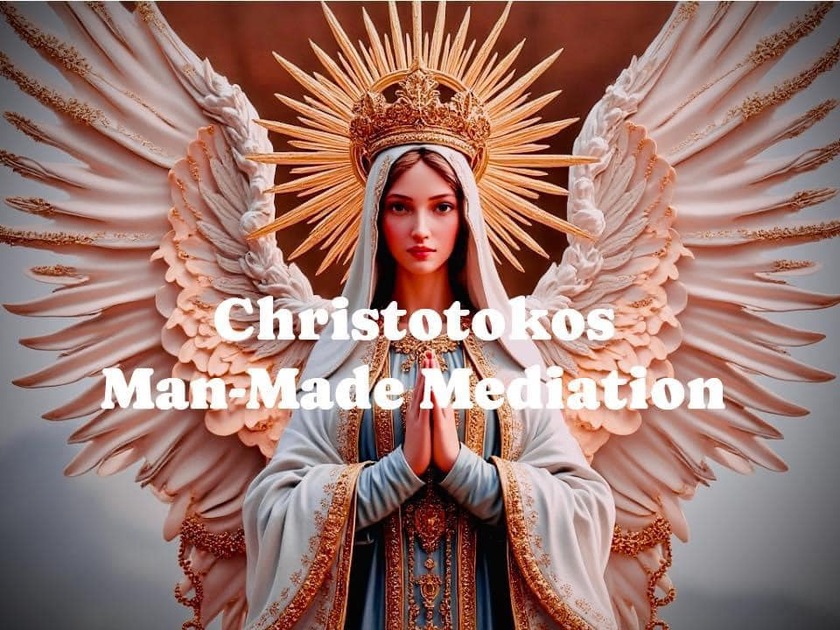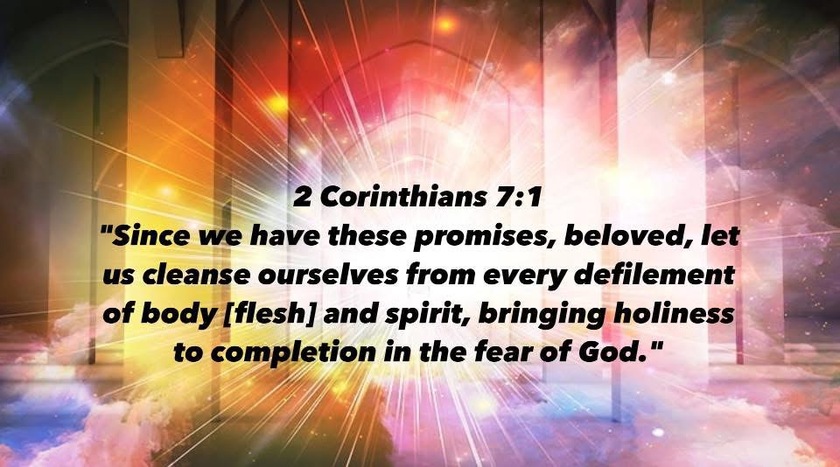Christotokos - Man-Made Mediation
Psalm 115:1-8
"Not to us, O Lord, not to us, but to your name goes all the glory for your unfailing love and faithfulness. Why let the nations say, “Where is their God?” Our God is in the heavens, and he does as he wishes. Their idols are merely things of silver and gold, shaped by human hands. They have mouths but cannot speak, and eyes but cannot see. They have ears but cannot hear, and noses but cannot smell. They have hands but cannot feel, and feet but cannot walk, and throats but cannot make a sound. And those who make idols are just like them, as are all who trust in them."
The Roman Catholic people believe Mary, the blessed and favored birth mother of Jesus, is the link between unholy humanity and the divine holiness of the triune God. Some say she gave Jesus his body, and it's his body that has saved us. Although she is not God, she has earned their respect and devotion by virtue of her womb having borne the divine child.
The question today is:
Why do they look to her for intercession, isn't this vanity, or is it worse, idolatry?
What do we know to be true? The Lord Jesus, son of the living God, alone is the source of loving-kindness, holiness, justice, and our hope of salvation. He is the creator and source of all truth. His truth is our shield of faith. And he alone should be feared (venerated). Jesus doesn't need to be reminded about our existence. He doesn't need a human interaction with his mother in order to intercede for us, because he is both human and God. And we don't need an intercessory relationship with the dead, in order for The Lord to recognize better our appeals and intercessions.
Psalm 116:1-2
"I love the Lord because he has heard my appeal for mercy. Because he has turned his ear to me, I will call out to him as long as I live."
Psalm 115:17-18
"It is not the dead who praise the Lord, those who go down to the place of silence; it is we who extol the Lord, both now and forevermore."
We don't need an intermediary relationship with artificiality. We do not need someone to make our case for us. And we especially don't want to approach Jesus through these intercessory idols because this Roman Catholic view of Mary, and the saints, calls into question the compassion, sympathy, and loving-kindness of God. It fosters doubts about The Holy One's commitment to our salvation and faith in the minds and hearts of the believers. They may not realize it's causing this problem in their hearts, but the outpouring of veneration towards church artifacts and artworks bears witness to those doubts and failures of faith.
Every reply on this subject that I've seen from the Roman Catholic worshiping people consistently leans on these idols helping them to ease the doubts they have about their faith, and also in how it aids in focusing their prayers. And I understand that need. I think every believer, no matter the denomination, has had to struggle with focused prayer and feelings of lostness from time to time. Afterall we are all living in the same world and all are dealing with its darkness that is all around us. And it's often hard to stay awake and pray. The apostles in the garden of Gethsemane could testify to that problem. In fact, they have testified to that.
Imagine being them. Imagine recording for all to see throughout all of human history their failure to keep awake in their prayers, and their faith, and their veneration. They knew about Jesus, and Mary. In fact, they had real-time instant access to Jesus and Mary, and still they failed to awaken their veneration. Maybe what was missing were a few statues or colored glass and arching cathedrals. Maybe a garden gnome St. Francis would have helped them stay awake. They were in a garden after-all.
Truth is:
The Lord Jesus is the object of all our worship. The Lord is the object of all our prayers and thanksgiving. The Father, Son and Holy Spirit, alone is to be worshiped, He alone is to be venerated. Within the triune God is everything we need to make our appeals. We are drawn into remembrance by The Holy Spirit. No need for wood, paint or stone. Our prayers are helped and advocated for by This Spirit. He awakens us to prayer. He inspires us to prayer and worship. And he delivers us into the presence of the Holy One, Son of the living God who is dwelling within us.
John 14:13
"‘Whatever you ask,’ Jesus said, ‘in My name that will I do that the Father may be glorified in the Son.’"
1 Timothy 2:5
"For there is one God, and one mediator also between God and men, the man Christ Jesus,"
Both the Old and New Testaments are abundantly clear on this, with the help of the Holy Spirit, we go directly to God the Son, and by God the Son directly to God the Father. No human living or dead, no artificial intercession is needed, not even for prayer focus, or for the formation of our faith. Idols are not a means of grace.
Here's the real deal:
The Holy Spirit is the missing link in the Roman Catholic veneration of the saints and mother Mary. Christotokos is an artificial attempt at achieving the works of The Holy Spirit. It is part visceral and part tangible. It is man-made mediation. And by definition that means it is idolatry.
The Roman Catholic teachers profess that Mary, mother of God, is the Co-Mediatrix. She is said to join with her son Jesus as a co-mediator of all the graces. They teach she is the channel of all graces by virtue of her womb. Quite literally they imagine she gives birth to grace. They teach Mary is the source of all mercies, and no graces are conferred on anyone without her mediation, intercession, and cooperation.
Pope John Paul II said, "Mary participates in our redemption."
He borrowed this thought from Pope Pius XI who stated, "Mary participates in the redemption achieved by her Son and all graces are granted only through her intercession. She participated with Jesus Christ in the very painful act of redemption."
And as if that wasn't idyllic enough the Roman Church teaches the idea of The Treasury of Merit, and that Mary has deposited there, in the heavenly bank of righteousness, more righteousness than she needed to get into heaven. They teach she has excess merit that she offers and pours out upon those who come to her for inspiration and intercession.
Again, they leave off The Holy Spirit and replace him with a man-made version of spiritual advocacy. They position Mother Mary between you and Jesus. She's there right now, in heaven, and she's dispensing grace like a spiritual ATM. No need to go inside the bank, no need to approach the altar and speak with the loan manager. Just slide your card and light a candle at Mary's shrine off to the side somewhere more convenient. It's quick, it's easy, it's more personal, and it's absent the power and works of The Holy Spirit.
The fact of the matter is, The Roman Catholic Church has invented a goddess. An idol who has eyes but cannot see, ears but cannot hear, feet but cannot walk, arms but cannot hold on to you, and hands that cannot deliver grace to you. Its paganism mingled with Gnosticism taking the name of the blessed human mother of Jesus Christ. It's good old fashioned Gnostic heresy. It's ancient feminism with roots in goddess worship which goes all the way back into Babylon. It's artificial, counterfeit, and a satanic ploy to overturn the divine order. Satan replaces The Holy Spirit with a graven image for those who need a tangible god that they can put in their pocket, or maybe in their landscaping.
It is a satanic attack upon the triune Godhead. It is a full-on assault upon Father God's sovereignty. It is an assault upon God the Holy Spirit, and it is an assault upon the divine intercession of God the Son and his sacrifice on the cross. This blasphemy crucifies Jesus over and over again.
They call her the mother of God (birthing grace), queen of heaven (sovereign), and comforter (advocate). She replaces the entire Triune Godhead.
The biblical truth:
Mary is introduced in Matthew 1:16 simply by these words, “To Jacob was born Joseph, the husband of Mary, by whom was born Jesus, who is called Christ.” She is never called "Mother of God" in the gospels or the New Testament. She is one of two different human family lineages that are offered as evidence of Jesus' royal ancestral bloodline.
How did this miraculous birth happen?
“The Holy Spirit will come upon you. The power of the Most High overshadow you. For that reason, the holy offspring shall be called the Son of God.” Luke 1:35
Does Mary share DNA with Jesus?
No one knows. All we do know is that Jesus is begotten, not made...
"We believe in one God, the Father almighty, maker of heaven and earth, of all things visible and invisible. And in one Lord Jesus Christ, the only Son of God, begotten from the Father before all ages, God from God, Light from Light, true God from true God, begotten, not made; of the same essence as the Father. Through him all things were made."
(Nicene Creed)
...we only know that The Holy Spirit caused Mary to bear a child. We've got no idea how that occurred. Did he form Jesus in her womb like the Creator formed Adam from the earth? Did he mold the elements of creation into the child? Did he borrow an unfertilized egg from Mary's womb and give it the spark of life to activate it into pregnancy? We simply do not know. We're not given that information. Maybe the Holy Spirit borrowed both Mary's and Joseph's DNA to make this happen. No one knows.
All we need to take away from what we do know is that she sees herself as the servant of the Lord, not God as her servant, and she accepts this announcement of her miraculous virgin pregnancy by the angel, and says, “Be it done unto me according to Your Word.”
Mary submits to God, God doesn’t submit to Mary, and Mary exalts the Lord; the Lord doesn’t exalt Mary. And here's the hitch-pin in her faith testimony. Mary states to Elizabeth, "My spirit has rejoiced in God, my Savior.” This is the most definitive statement she ever makes. She testifies and identifies to whom she worships and to whom she ascribes as HER OWN source for salvation.
Mary offers no other source for access to The King of Kings other than Jesus Christ himself. And I believe this blessed favored servant of God would be horrified by the veneration ascribed to her in her name by the gnostic mystics and pagan influencers in The Roman Catholic Church.
Amen and God Bless, you are now and forever blessed in Christ's name alone.
#Christotokos #MaryMotherOfGod #Idolatry




















